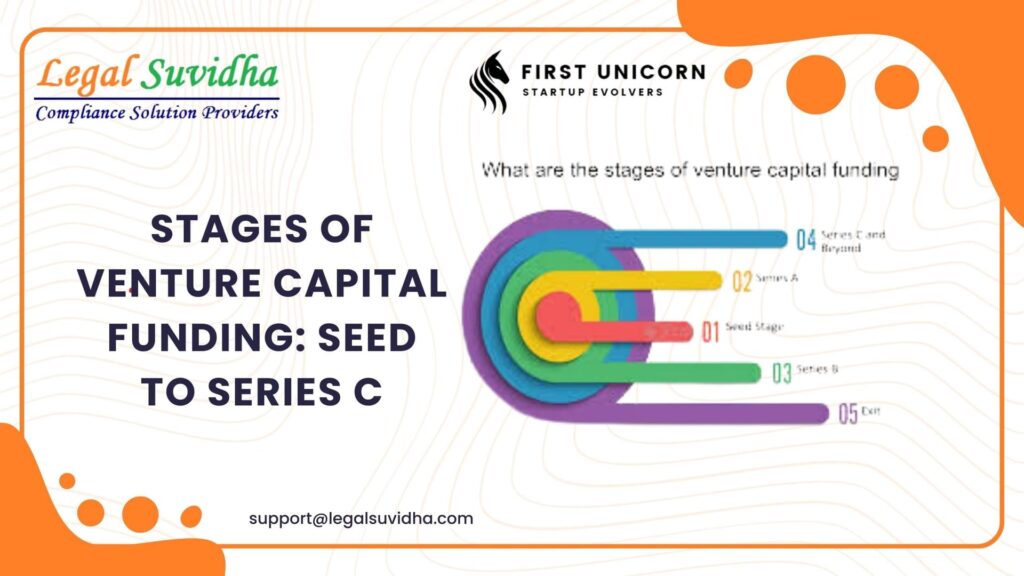Stages of Venture Capital Funding: Seed to Series C
1. Seed Funding (Seed Stage)
Overview: Seed funding is the very first stage of venture capital investment. At this point, a startup is typically in its idea or product development phase, and it may not yet be generating significant revenue. The main goal at this stage is to help the startup develop a prototype, conduct market research, and establish a foundation for growth.
Funding Purpose:
- Product Development: Developing the initial product or prototype.
- Market Research: Understanding customer needs, target market, and competition.
- Business Plan Refinement: Crafting a business model and marketing strategy.
- Initial Operations: Building a team, setting up legal and administrative frameworks.
Sources of Seed Funding:
- Angel Investors: Individual investors who provide capital in exchange for equity.
- Friends and Family: Close networks of the entrepreneur.
- Seed VC Funds: Venture capital funds that specialize in early-stage investments.
- Crowdfunding: Platforms like Kickstarter or Indiegogo where small contributions are pooled from many people.
Investment Amount: Typically ranges from $10,000 to $2 million.
Equity Dilution: Founders may give away 10-25% equity at this stage.
Risks: At this stage, the startup is highly speculative, and investors often look at the founder’s vision and the potential for growth.
2. Series A Funding
Overview: Series A funding is the next step after seed funding, and it typically comes when the startup has a proven concept, a working product, and some market validation. This stage focuses on scaling the business.
Funding Purpose:
- Product Scaling: Refining and improving the product to meet broader market needs.
- Team Expansion: Hiring key personnel, especially in areas such as marketing, sales, and product development.
- Customer Acquisition: Establishing and scaling marketing and sales channels.
- Operational Expansion: Building infrastructure to handle increased demand.
Sources of Series A Funding: Venture Capital Firms, Corporate Venture Capital.
Investment Amount: Typically ranges from $2 million to $15 million.
Equity Dilution: Founders might give up 15-30% of their equity in this round.
Risks: The startup is still growing and may not yet be profitable. However, it has moved beyond the “high-risk” early stage and needs more capital to scale.
3. Series B Funding
Overview: Series B funding occurs once the company has successfully scaled its product, proven its market fit, and is ready for further expansion. It’s often used to scale the business even further in terms of product development, market reach, and team growth.
Funding Purpose:
- Market Expansion: Entering new markets or regions.
- Technology Upgrades: Enhancing the product with more advanced features or launching new products.
- Talent Acquisition: Hiring senior management and specialized employees.
- Brand Building: Strengthening brand presence and increasing awareness.
Sources of Series B Funding: Venture Capital Firms, Private Equity Firms, Existing Investors.
Investment Amount: Typically ranges from $15 million to $50 million.
Equity Dilution: Founders give up 10-20% of equity during this round.
Risks: The company is now expected to show more stable revenue growth, but there is still a high level of risk involved due to the competitive market dynamics.
4. Series C Funding
Overview: Series C funding comes when the company is scaling aggressively and may even be preparing for an IPO (Initial Public Offering) or acquisition. By this stage, the company is usually profitable or close to profitability.
Funding Purpose:
- Acquisitions: Purchasing other companies to expand product offerings, reach new markets, or eliminate competition.
- Global Expansion: Expanding into international markets.
- Revenue Diversification: Developing new revenue streams.
- IPO Preparation: Preparing the company for an eventual public offering or other liquidity events.
Sources of Series C Funding: Venture Capital Firms, Private Equity Firms, Hedge Funds, Corporate Investors.
Investment Amount: Typically ranges from $50 million to $100 million or more.
Equity Dilution: Founders typically give up 5-10% equity at this stage.
Risks: The business is expected to have a strong market presence and robust financials, but the challenge is keeping up with growth and competition.
Key Differences Between Funding Rounds
Purpose of Funds: Seed funding focuses on product development and market research, while Series A and beyond focus on scaling, marketing, and expansion.
Investor Profile: Seed funding often comes from angel investors or seed VCs, while later rounds involve institutional VCs, private equity firms, and sometimes corporate investors.
Risk Level: Seed and Series A funding come with higher risk because the company is still establishing itself. By Series B and C, the business is more mature, and the risk of failure decreases, though it remains present.
Company Milestones: Seed companies may have just a business idea or prototype, Series A companies have a product-market fit, Series B companies are scaling, and Series C companies are preparing for exits or further expansion.
Funding Size: The funding size grows progressively from Seed to Series C, with Seed typically being the smallest and Series C being the largest, often in the hundreds of millions.
Conclusion
Each round of venture capital funding (Seed to Series C) serves a critical purpose in helping a startup grow from an idea into a fully established company. Founders
Looking for more insights or want to start your own startup?
Are you looking for Startup Funding/Grant/Loan for your Business, Fill the below attached form today!
https://forms.gle/R7t7zTQGjiKEFEu86










